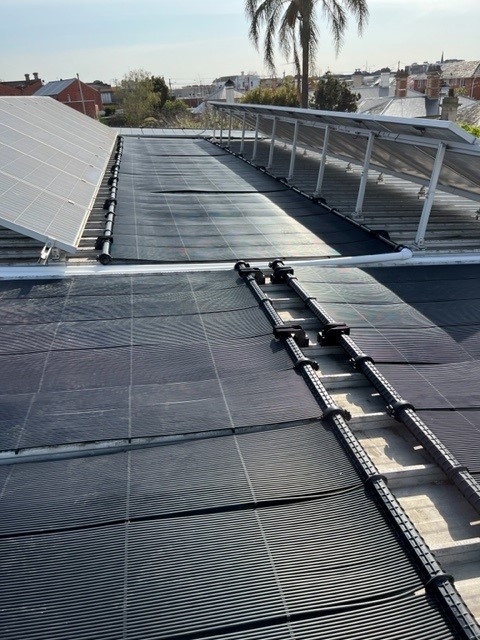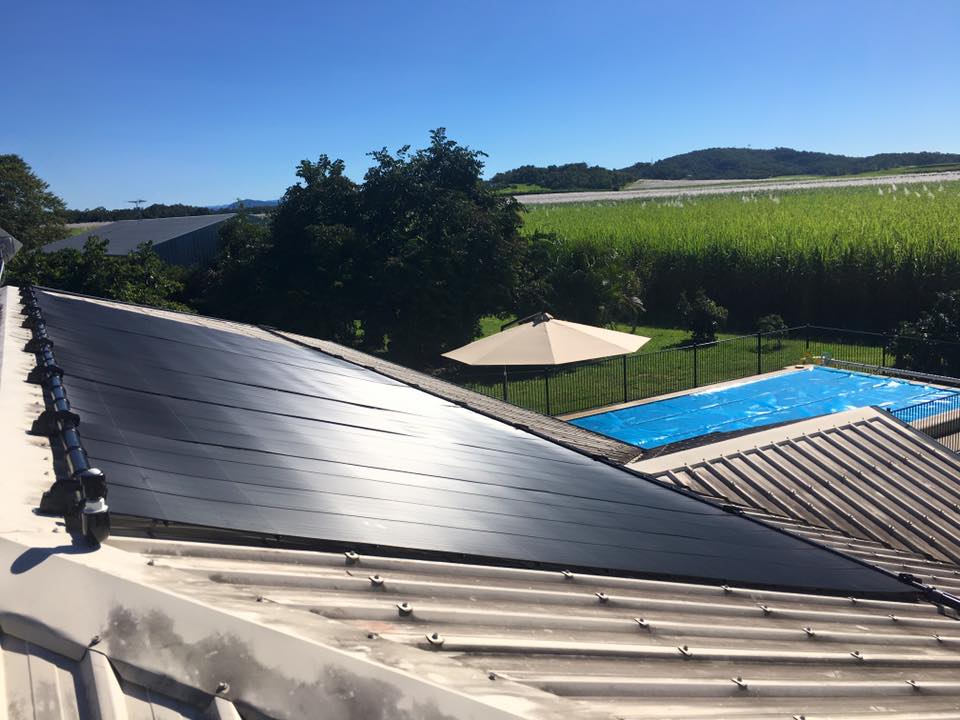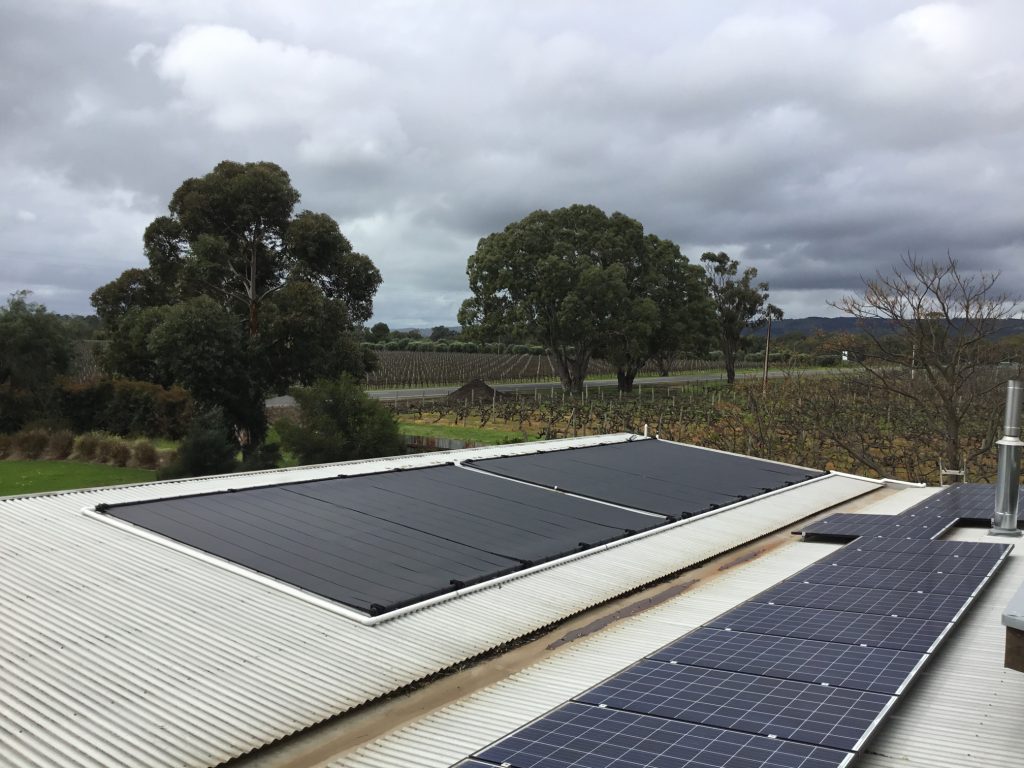There’s nothing like taking a dip in a home swimming pool. It’s a great way to have fun, exercise, and spend quality time with friends and family. But, with energy costs climbing, keeping your pool heated can be a source of stress. Luckily for you, you can decrease your pool’s heating costs by installing a solar swimming pool heater.
If you’re considering going solar, you might want to first understand what conditions solar pool heating systems require, to make sure your home swimming pool setup is a good fit. Then, you’ll want to learn how solar pool heating works, to ensure that your solar pool heating system’s parts are doing what they should, immediately upon installation. Finally, you might want to look into various solar pool heating solutions, such as hybrid heaters, to extend your swimming season, without extending your pool heating costs.
Let’s dive into these considerations, head-first.
What conditions are required for installing solar pool heating systems?
When seeking to install a solar pool heating system, it’s important to first assess your pool’s size and shape. Here, measuring the length, width, and depth of your pool from its inside walls is essential. Then, multiply those dimensions to obtain your pool’s total volume. The result you obtain will indicate how many collectors (solar panels) are required to optimally heat your pool.
Next, you’ll need to determine how your solar panels will be positioned, by evaluating the size, type, state, and direction of the roof on which they will be installed. It’s important to ensure that your roof has enough physical space to hold the solar panels, and that it is sturdy enough to hold the added weight.
Note that most roof types can accommodate the panels, but skylights, air conditioner units, and vents are not usable space, and, therefore, require dedicated connector parts to circumvent them to in order to take optimal advantage of the surface. It’s also important to note that a roof facing south in the
northern hemisphere will be most effective, while the opposite is true for a roof in the southern hemisphere.
Other conditions that can impact solar pool heating installations include the amount of shade in the area (that would block sunlight from making its way to the solar panels), space for installing a pool pump to keep your water clean, and who and who will install and maintain the solar pool heating system at your home.
How does solar pool heating work, really?
Now that you’ve determined that you CAN install a solar pool heating system for your home pool, you might want to get a better idea of how the system works, so that you can (a) understand why it’s such a great investment, and (b) so you can most efficiently identify the root of any sub-optimal operations, should they occur (but trust us, that almost never happens – these systems are the best!).
As touched upon above, there are a few key components that come together to harness energy from the sun and use it to heat your pool. These are:
- Solar collectors — Solar panels are installed on the roof of your home or pergola. They draw in the sun and perform the actual heating.
- Pool pump — The pump pushes the heated water through a series of pipes and into the pool. It also pushes cool water back up through the pipes, to be heated by the collectors.
- Pool filter — The filter removes dirt, leaves, and other debris from the pool.
The cycle of solar swimming pool heating works as follows:
First, you set your desired pool water temperature, which indicates to the solar collector, how warm the water should be before it is returned to the pool.
Second, the pool pump pushes the cool pool water through the filter, ensuring that it is clean and that only water enters the solar collector pipes, preventing blockages.
The water then makes its way to the solar collectors, starting at the bottom of the panel, As it continues to be pushed upwards to the top of the panel through individual tubes, the sun’s energy gradually heats the water to the desired temperature.
The heated pool water is then pushed back into the pool, with the cycle continuously repeating itself, to maintain the perfect temperature for your home swimming enjoyment.
Note that this entire process is performed automatically; all you need to do is ensure you’ve adequately applied your sunscreen, before making a splash in your economical and environmentally-friendly heated swimming pool.
Can solar swimming pool heaters be used in the winter?
Hybrid solar swimming pool heating systems are the ideal choice, if you’re looking to extend your swimming season through cool and even mild winter weather. These systems primarily rely on solar energy to heat your pool, but are integrated with a gas or electric backup system, so you’re never left shivering in the water. In this way, you are able to keep using free, green solar energy as long as possible, and keep your gas or electric bills to a minimum.
The Bottom Line
If you’re looking to gain a better understanding of how to heat your home swimming pool amid rising energy costs and in the face of climate change, a solar pool heating system is your best bet. These systems operate in a straightforward and continuous manner, require little to no maintenance, and can be combined with backup energy sources, to further extend your swimming season, and make the most of your home swimming pool experience.
ClimateCare Certified, Magen eco-Energy’s solar swimming pool heaters for domestic and commercial swimming pools integrate unique engineering, multiple registered patents, strict compliance with the most stringent regulations, and continuous research and development to ensure that your swimming season is as enjoyable, energy-efficient, affordable, and reliable, as possible. Found in over half a million pools in 80+ countries, including in Australia, the US, Europe, and Mexico, our systems are purpose-built to meet your home swimming pool needs, head-on.
For more information and to order a Magen eco-Energy solar swimming pool heater that optimally meets your swimming pool and surrounding area’s considerations, contact us today!






